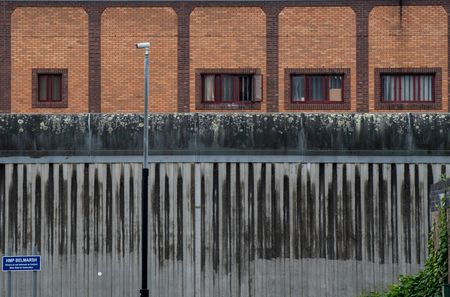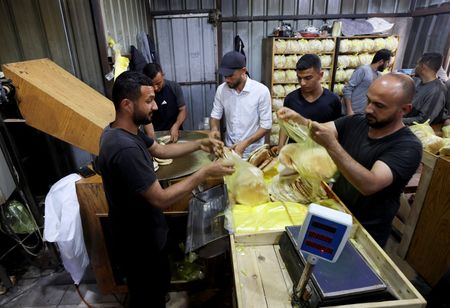By Andy Bruce
MANCHESTER, England (Reuters) – A downturn for British firms eased in May despite a darkening picture for manufacturers who cut jobs at one of the fastest rates since the global financial crisis almost 20 years ago, according to a survey published on Thursday.
The S&P Global UK Composite Purchasing Managers’ Index (PMI), a gauge of the private sector economy, rose to 49.4 from 48.5 in April, roughly as expected by economists polled by Reuters and matching the reading for the euro zone.
Readings below 50 denote a contraction in business activity.
While the services sector which dominates Britain’s economy edged back into growth territory, factories reported the biggest drop in jobs since May 2020 which dragged the manufacturing PMI down.
Official data published earlier this month showed Britain’s economy expanded strongly in the first quarter of 2025.
However, the Bank of England believes the underlying pace of growth is far weaker and Wednesday’s PMI chimed with that view, with survey compiler S&P Global warning of the possibility of an economic contraction in the second quarter.
“The PMIs suggest that the biggest hit to the economy was in April and things are now starting to recover,” said Thomas Pugh, economist at tax and consulting firm RSM.
“That said, growth is likely to be bumpy this year, and the economy will still be facing the headwinds of tariffs, uncertainty and taxes that it didn’t have in Q1.”
The PMI showed businesses grew a little cheerier about the outlook, with fewer worries about the impact of higher U.S. trade tariffs. Earlier this month Britain and the United States signed an accord to reduce tariffs and trade barriers in key areas.
U.S. President Donald Trump has also suspended the heaviest of his tariff increases for other countries, easing some of the concerns about their impact on the global economy.
“Although brighter news on tariffs and trade appears to have helped restore some confidence among businesses, sentiment about prospects in the year ahead is still subdued,” said Chris Williamson, S&P Global Market Intelligence’s chief business economist.
Thursday’s survey showed business price pressures weakened noticeably in May which may reassure BoE officials after data on Wednesday showed consumer price inflation jumped last month by more than expected.
The PMI for the services sector rose in May to 50.2 from 49.0, although new orders contracted at the fastest rate since late 2022 – a bad omen for future months.
Still, services firms in Britain performed a little better than their French and German peers in May, the PMIs showed.
British manufacturers, however, fared far worse.
The UK manufacturing PMI fell to 45.1 from 45.4 and the jobs index for the sector sank to its lowest level since the onset of the COVID-19 pandemic. Outside of that, it was the lowest since the 2008-09 recession.
April’s PMI showed British manufacturers suffered a greater fall in export orders than in any of the 28 countries measured by S&P Global. That index improved in May, but stayed deep in contraction territory.
A separate survey from the Confederation of British Industry showed British manufacturers this month suffered the sharpest contractions in orders and output since around the turn of the year.
(Reporting by Andy Bruce; Editing by Toby Chopra)









